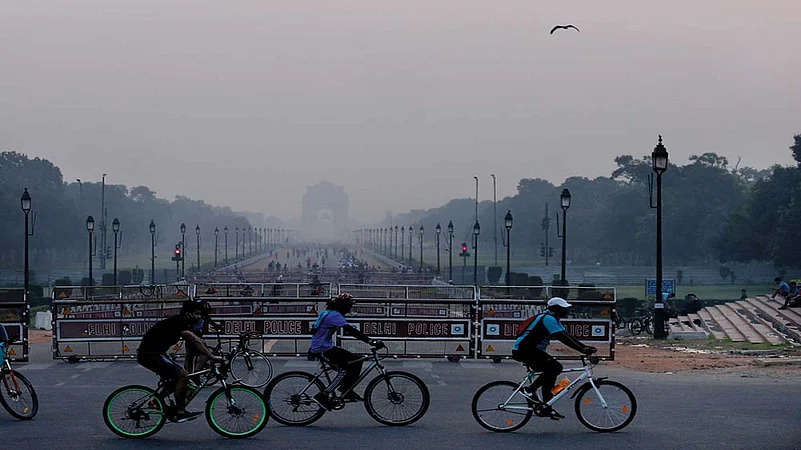As we write this, residents of more than 100 Indian cities are breathing polluted air, some among the most polluted in the world. According to the Air Quality Life Index (AQLI), Indian citizens lose an average of 5.2 years of their lives due to poor air quality. In some of the most polluted cities, like Delhi, people can lose even more. Research and data clearly indicate that India’s air pollution is a national health emergency.
But India is not the first country to battle the scourge of air pollution. In the past, there are cities that have experienced life-threatening levels of air pollution. In 1952, the great smog in London is estimated to have caused 12,000 deaths. Los Angeles was infamous for its toxic smog through the 1970s. Less than a decade ago, Beijing was known for its “airpocalypse”. So how did authorities in these countries get rid of grey skies? Are there lessons for Indian cities?
The experience from these cities indicate that a lot has to do with the law– specifically the recognition of public health impacts of air pollution in the law. By placing health improvements as the legal justification for air pollution regulations, London, Los Angeles, Beijing, and other cities have had the political space to achieve tremendous improvements in air pollution. Unfortunately, India’s Air (Prevention and Control) Act, 1981 does not put adequate stress on protecting public health, which makes it easier to prioritise polluters’ interests.
We believe that amending India’s Air Act would set off improvements in air quality similar to these other cities. And without such an amendment, it will continue to be difficult to protect our health from the dangers of air pollution.
A little history and comparison. The central goal of the 1970 US Clean Air Act is “to protect public health and public welfare”. As a consequence, it has always been clear that incurring costs from reducing air pollution are justified by improvements in health. Closer to home, Beijing has been taking extraordinary steps since it declared a “war on pollution” in 2013 that was launched in response to concerns about the health consequences of air pollution: the result has been rapid reductions in particulates air pollution that are unprecedented in human history. Recently, the UK Government announced a Clean Air Strategy that recognises poor air quality as the “largest environmental health risk in the UK”.
We believe that this can be done in India with two key changes. First, we respectfully recommend that the Air Act should add “the protection of public health” as an explicit goal, along with the existing goals of “prevention, control and abatement of air pollution”.
Second, the Air Act should require that potential regulations be subject to cost-benefit analysis where industries’ costs of reducing emissions are compared with the health and other benefits, expressed in terms of the monetary value of the improvements in health. This is the approach in the United States and elsewhere and the prioritisation of regulations where the benefits exceed the costs makes it possible to foster economic growth and protect the public from the health ravages of air pollution.
Amending the Air Act to include protection of public health will also further strengthen some exciting innovations in India’s pollution regulatory regime. For example, Gujarat piloted the world’s first Particulate Matter based Emission Trading Scheme (ETS), which is reducing air pollution and compliance costs, and is now looking to expand it. This experience highlights that market-based environmental regulations can deliver in India, just as they have in so many other parts of the world. With a legal requirement to protect the public health, this experimental initiative, along with others that prove promising, have a better chance to achieve escape velocity and benefit the entire country.
Further, the seeds of political change are more and more evident. Newspapers, television, and talk on the street are all bemoaning the health problems from air pollution, especially in Northern India. Further, Doctors for Clean Air has spread across the country raising awareness about the impact of air pollution on human health and environment clubs of Indian schools are discussing air pollution more frequently. There also has been a growing voice in the Indian Parliament on the issue of air pollution, as number of law-makers have put forward parliamentary questions, drawing attention on the health impacts of air pollution. A parliamentary session last year, even saw a special mention calling for an amendment to the Air Act–which will “prioritise the health and productivity of citizens”.
Of course, the government is also taking more focused action by introducing the National Clean Air Plan, but its task is more difficult because it does not currently have public health and cost-benefit analysis as legal foundations. Two small modernisation of India’s historic Air Act could unlock much healthier and longer lives for all Indians. The decision is there to be taken.
(Views are personal)
Dr. Arvind Kumar is Chairman, Institute of Chest Surgery, Chest Onco-Surgery and Lung Transplantation at Medanta - The Medicity, Gurugram, and Founder of the Lung Care Foundation
Prof. Michael Greenstone is the Milton Friedman Distinguished Service Professor in Economics and Director of the Energy Policy Institute at the University of Chicago.





















